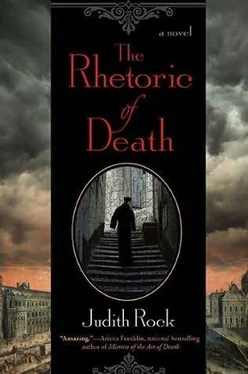Judith Rock - The Rhetoric of Death
Здесь есть возможность читать онлайн «Judith Rock - The Rhetoric of Death» весь текст электронной книги совершенно бесплатно (целиком полную версию без сокращений). В некоторых случаях можно слушать аудио, скачать через торрент в формате fb2 и присутствует краткое содержание. Жанр: Исторический детектив, на английском языке. Описание произведения, (предисловие) а так же отзывы посетителей доступны на портале библиотеки ЛибКат.
- Название:The Rhetoric of Death
- Автор:
- Жанр:
- Год:неизвестен
- ISBN:нет данных
- Рейтинг книги:3 / 5. Голосов: 1
-
Избранное:Добавить в избранное
- Отзывы:
-
Ваша оценка:
- 60
- 1
- 2
- 3
- 4
- 5
The Rhetoric of Death: краткое содержание, описание и аннотация
Предлагаем к чтению аннотацию, описание, краткое содержание или предисловие (зависит от того, что написал сам автор книги «The Rhetoric of Death»). Если вы не нашли необходимую информацию о книге — напишите в комментариях, мы постараемся отыскать её.
The Rhetoric of Death — читать онлайн бесплатно полную книгу (весь текст) целиком
Ниже представлен текст книги, разбитый по страницам. Система сохранения места последней прочитанной страницы, позволяет с удобством читать онлайн бесплатно книгу «The Rhetoric of Death», без необходимости каждый раз заново искать на чём Вы остановились. Поставьте закладку, и сможете в любой момент перейти на страницу, на которой закончили чтение.
Интервал:
Закладка:
Mostly, though, he didn’t want to die. Charles shuddered and closed his eyes, suddenly back at the siege of St. Omer. He heard the din of drums and trumpets and smelled the crazy battle energy, like the air before a storm. He heard the screams of men and horses, saw the blood gleaming on pikes and swords, heard the crack of muskets, and breathed the bitter smell of gunpowder. He’d been as full of battle lust as any man there, secure in the immortality of being eighteen. When the musket ball hit him, he’d thought at first that someone’s horse had kicked him. Then he’d seen the bright flower of blood blooming on the shoulder of his padded doublet. The certainty that he was going to die had wiped away his adolescent fantasy of noble death after thwarted love, and he’d thrown back his head and howled-not from the pain, but in grief for his unlived life. He had even less desire to die now.
He opened his eyes and watched the sky shed its last thin veil of fog, watched hunting swallows skim the slow, olive green river, watched a pair of bargemen sprawled on their canvas-wrapped load passing a leather bottle back and forth, watched as though he were going to paint it all. The words of another ex-soldier rose from the depths of memory. “Let it make no difference to thee,” Roman Emperor Marcus Aurelius Antoninus had written, “whether thou art dying or doing something else.” With a mental salute to the old stoic, Charles straightened. Time to get on with the something else. With being La Reynie’s fly, which he wouldn’t be if he’d obeyed the rector’s order to leave Philippe’s murder and Antoine’s accident alone. But if he started obeying now, he’d die. La Reynie would see to that. If he kept on disobeying and the rector found out, he’d lose his vocation. Which he preferred to lose by choice, if he was going to lose it. But he wasn’t dying, not yet.
He pushed off from the parapet, waved away a man selling cherries from his donkey’s panniers, and walked on. He squeezed around a sedan chair, set down beside the mackerel sellers while the lady inside chose her dinner, and hesitated at the end of the bridge. He’d reached the Pont Neuf from the quay, but cutting through the streets might be a faster way back to the college. Paris, like other towns, had no street signs, and he was too new to have a map in his head. But the sun was out now and the college lay to the southeast. How lost could he get?
He set off along the busy street that continued from the Pont Neuf, beside the wall of the Grand Augustin monastery, looking for a southeast turning. As he walked, he set himself to go over everything he knew about the murders and Antoine’s injury. He wasn’t at all sure of La Reynie’s motives, not completely sure that finding the killer was what La Reynie really wanted. It had crossed his mind that La Reynie might be looking for something else inside the college, something Charles didn’t know about, and be using the search for the killer as an excuse. But finding the killer was what Charles wanted. That and surviving his indenture as a fly, with minimal betrayal to the Society and his vows. All of which was going to depend on concocting reports that were true as far as they went and went only as far as he wanted them to.
Like an orator making his first point, he held up a thumb. One: The fact that La Reynie needed a spy in the college meant that what had happened was part of something that stretched from Paris into Louis le Grand. Or, of course, the other way around. His first finger went up. Two: According to the ex-soldier who’d taken him to the Louvre, the murdered porter had complained that someone was following him. But the man had been killed before he could tell Charles what he knew, so someone had been following both of them. Charles swallowed and looked over his shoulder, suddenly remembering the menacing gravel-voiced porter who’d stopped him from chasing Pierre. Had the man had his own reasons for trying to keep Pierre from talking to Charles?
His middle finger sprang to attention. Three: The mark on the porter’s neck was like the mark on Philippe’s. Who knew how Philippe had died? The Louis le Grand faculty and lay brothers. Probably most of the students by now. La Reynie and some of his men. And, no doubt, Louvois, which meant that all three persons of that unholy trinity-La Reynie, Louvois, and Guise-knew about the braided cord the murderer had used.
Charles turned down a lane lined with old houses faced with stone and straightened his ring finger. Four: Guise was the only other person at the college-as far as Charles knew-who had talked to the street porter Pierre. But surely, Charles told himself, if Guise had followed him yesterday, he would have noticed. And he couldn’t imagine the fastidious Guise slinking through the beggars’ Louvre in the dead of night to murder poor Pierre. But there were the old stairs. If Guise watched his chance in the bakery, he could come and go from his rooms unseen whenever he pleased.
Charles’s little finger jabbed the air. Five: Mme LeClerc had witnessed the accident, and had no qualms about talking, yet no one was trying to silence her. The thought of anyone trying to silence Mme LeClerc, however, made Charles laugh out loud, earning him a wary look from a woman with a basket of squawking chickens. So why had the porter been a danger, but not the baker’s wife?
The little street dead-ended and Charles stopped, waiting for a clutch of Augustinian monks to pass on the cross street. He turned right and his left thumb stood up. Six: The dead porter, Antoine’s story of the note, and the old staircase were all connected, one way or another, to Guise.
Charles’s thoughts suddenly jumped their logical track. Guise seemed not to know what Charles had done in Nimes. Which must mean that La Reynie had not told him. Charles frowned, remembering how La Reynie had watched Louvois accuse him after the funeral, neither contradicting nor agreeing. And then La Reynie had kept Louvois from following him and Antoine. Puzzling over La Reynie, Charles turned east at the next street crossing. But that street curved north and took him nearly back to the river. He stopped, looked around, and held up his next finger. Seven: He was lost.
By the time he found the rue St. Jacques and the college again, the midday meal was half over. He apologized to the rector, slid into his seat, and bolted the boiled beef, brown bread, and cucumber salad, made all the more palatable by the fact that Pere Guise ate with his back half turned to Charles, talking only to Pere Montville on his left. Pere Jouvancy caught Charles on his way out of the refectory to ask solicitously after his tooth. Swallowing guilt, Charles said that his courage had failed him and he’d decided to try medicine before facing the tooth-drawer. Nodding sympathetically, Jouvancy told him to ask Frere Brunet for something to ease the pain. And added an admonition not to be late for rehearsal.
Charles checked to see that Antoine was where he should be, waiting with his class to leave the junior refectory, and went outside, where the quiet recreation hour had started. He sat down on a bench against the refectory wall, pretending to watch a chess game two boys were playing at the bench’s other end. When Guise emerged, Charles let him get halfway across the court and then strolled, unnoticed, in his wake. He watched Guise enter the latrine courtyard and go into the building where the students’ library was. Assuming the air of a man who wanted only to be alone with his sore tooth and his thoughts, Charles settled on the shady stone bench built into the archway between the two courts and waited, but Guise didn’t reappear. Ostentatiously rubbing his jaw, Charles made his way back toward his rooms through an illicitly rowdy game of tag.
Taking the stairs two at a time, he went to Guise’s door and listened, then eased it open and went quickly through the empty chamber to the study. Just where Antoine had given his sleepwalking performance, a brown and gold tapestry of Hannibal and his elephants crossing the Alps hung on wooden rings from a pole. Charles slid it aside and uncovered the low, arched door he’d seen from the other side. He tried the latch. The door swung silently inward, revealing the staircase Charles had climbed. As he put his foot on the top step to go and see if the lower door was still unlocked, he heard footsteps climbing the stairs quickly toward him. Noiselessly, he shut the door, pulled the tapestry across it, and raced into the chamber. As he slid out of sight between Guise’s bed and the wall, the hanging rattled on its rings and footsteps crossed the study. He pressed his cheek to the floor and saw a pair of spurred boots with folded tops stride quickly across his line of vision. Jackboots the color of burnt sugar, like the boots Mme LeClerc said Antoine’s attacker had worn.
Читать дальшеИнтервал:
Закладка:
Похожие книги на «The Rhetoric of Death»
Представляем Вашему вниманию похожие книги на «The Rhetoric of Death» списком для выбора. Мы отобрали схожую по названию и смыслу литературу в надежде предоставить читателям больше вариантов отыскать новые, интересные, ещё непрочитанные произведения.
Обсуждение, отзывы о книге «The Rhetoric of Death» и просто собственные мнения читателей. Оставьте ваши комментарии, напишите, что Вы думаете о произведении, его смысле или главных героях. Укажите что конкретно понравилось, а что нет, и почему Вы так считаете.












